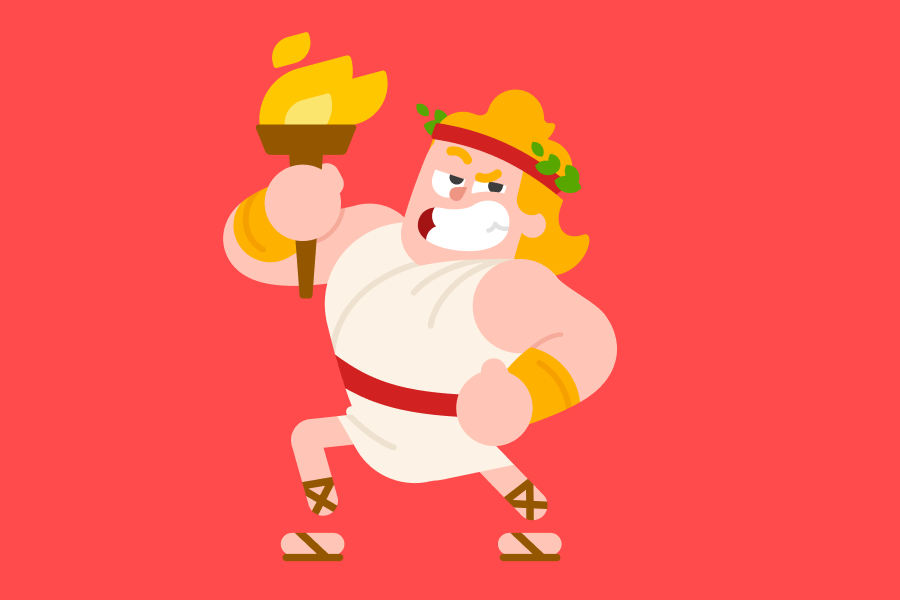The Olympic torch will soon arrive in Paris, where it will burn brightly for the thirty-third Olympiad. For a fun way to practice your Spanish this summer, try watching—and discussing!— the Olympics en español.
Here's the vocabulary you'll need to enjoy the Summer Games!
Spanish names for Olympic sports
There are over 30 sports being contested in this summer’s Olympic Games, or Juegos Olímpicos (abbreviated JJOO). Many of them are classics that have been part of the Olympics for decades or longer, such as el voleibol (volleyball) and el tenis (tennis).
When discussing these sports in Spanish, unlike in English, it’s important to use the article as in, el fútbol (soccer). Not all sports have the same grammatical gender, though, so how do you know which sports use the feminine (la) or masculine (el) article?
Similar to many nouns in Spanish, sports ending in -o take a masculine article, and those with names ending in -a take a feminine article: for example, el ciclismo (cycling) and la esgrima (fencing).
But what about sports that do not end in either -o or -a in Spanish? The vast majority of these are masculine: el bádminton (badminton), el golf (golf), el rugby (rugby), and el triatlón (triathlon). It is a common practice in Spanish for loanwords to take masculine gender unless there is a particular reason not to.
The one exception among the summer Olympic sports is la natación (swimming). This word ends in -ción, like la inspiración and la distinción, indicating a Latin origin. This group of words took on the feminine grammatical gender when they entered into Spanish long ago.
This year, there are four optional sports at the Olympics, one of which is completely new: el breaking (breakdancing)! The other three are el surf (also el surfing, for surfing), el skateboarding (you guessed it—skateboarding), and la escalada deportiva (sport climbing). As you can see, the borrowings from English again get the masculine gender. However, with la escalada deportiva, there was already a Spanish name for it, and it follows the usual Spanish patterns of grammatical gender, so escalada uses the feminine article.
Spanish vocabulary for track and field
Now let’s take a look at some helpful vocabulary for three of the most popular sports!
First, one of the oldest and most popular is el atletismo (track and field). The events in el atletismo include:
| Spanish | English |
| la pista | track (the oval and the sport) |
| la carrera de velocidad | sprint race |
| la carrera de (medio) fondo | (middle) distant races |
| las vallas | hurdles |
| la marcha atlética | race walking |
| el salto de longitud | long jump |
| el salto de altura | high jump |
| el triple salto | triple jump |
| el salto de pértiga | pole vault |
| el lanzamiento de jabalina | javelin throw |
| el lanzamiento de peso | shot put |
| el lanzamiento de disco | discus throw |
| el lanzamiento de martillo | hammer throw |
| el heptatlón | heptathlon |
| el decatlón | decathlon |
Spanish vocabulary for gymnastics
Another very popular sport is la gimnasia (gymnastics). Although there are three disciplines—la gimnasia artística, la gimnasia rítmica, and la gimnasia en trampolín—the one most people watch is la gimnasia artística. Here are some helpful terms for discussing la gimnasia artística:
| Spanish | English |
| la rutina | routine |
| el ejercicio de suelo | floor exercise |
| el salto de potro | vault |
| las barras paralelas | parallel bars |
| las barras asimétricas | uneven bars |
| la barra horizontal | high bar |
| las barras de equilibrio | beam |
| las anillas | rings |
| el caballo con arcos | pommel horse |
Spanish vocabulary for swimming
The third most popular summer Olympic sport is la natación (swimming), Most of us only need to know the phrase nadar perrito (doggy paddle) for our regular lives, but here's the vocabulary and variations you can expect to hear for la natación at the Olympics:
| Spanish | English |
| la piscina / alberca | pool |
| la natación en aguas abiertas | open water (marathon) swimming |
| la carrera de relevo | relay race |
| la brazada | stroke |
| la patada | kick |
| el estilo espalda / dorso | backstroke |
| el estilo mariposa | butterfly stroke |
| el estilo braza / pecho | breaststroke |
| el estilo libre / crol | freestyle / crawl |
| combinado | IM (individual medley) |
¡Vamos!
Now that you know a little bit about how to discuss the Olympics in Spanish, go cheer on your favorite Spanish-speaking athletes! Look out to see if anyone might batir un récord (break a record) and whether your favorite athletes will ganar una medalla de oro, plata o bronce (win a gold, silver, or bronze medal). ¡Anda! ¡Dale!
